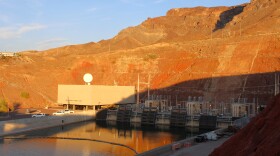-
Ted Cooke had been tapped to run the Bureau of Reclamation, but withdrew as some Upper Basin states worried about potential bias.
-
States that use Colorado River water need to agree on new rules for sharing it by 2026. If they don't, they will likely end up in messy court battles.
-
Cooke is the former manager of the Central Arizona Project. The region's water experts regard him as a qualified expert.
-
Money from the Inflation Reduction Act has helped save water in the drought-stricken Colorado River Basin. President-elect Trump appears poised to take away funding for those programs.
-
The Biden Administration's Interior Department released proposals for managing the river in an apparent attempt to nudge the states toward agreement.
-
Arizona's top water official said states are still unable to agree on new rules for sharing water after 2026.
-
Water managers across the West say they do not expect a new Trump administration will alter post-2026 Colorado River talks.
-
Engineering hurdles, high costs and political challenges stand in the way of an easy fix to the West's water shortages. This is Part 1 in the Western Water Myths five-part series.
-
The river outlet pipes inside Glen Canyon Dam are getting a $9 million repair job, but conservation groups want to see more permanent changes at Lake Powell.
-
State, federal and tribal leaders met in Boulder, Colo. to talk about the Colorado River's next chapter. They don't appear close to an agreement.

Play Live Radio
Next Up:
0:00
0:00
Available On Air Stations










